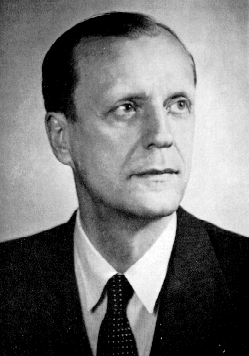| Profile | Major Works | Resources |
Ragnar Nurkse, 1907-1959

Followed up on Rostenstein- Rodan's thesis and anticipated much of the Lewis doctrine in stressing the role of savings and capital-formation in economic development. Early expounder of the "balanced growth" doctrine.
Born and raised in Estonia, then part of the Russian empire, Ragnar
Nurske began his education at the University of Dorpat (Tartu) in 1926.
But in 1929, Nurske moved to Edinburgh, completing his first degree at
the university there in 1932. Nurkse proceeded to Vienna, where he came
into the orbit of the Austrian School,
particularly Gottfried von Haberler. In 1934,
Nurkse moved out of academia and joined the secretariat of the League of
Nations in Geneva, working primarily as a researcher. With a few
publications already under his belt, Nurkse enrolled in the Ph.D.
program at Edinburgh, but never got around to completing it. During
World War II, Nurkse emigrated with other League staff to Princeton, in
the United States. Nurkse was the primary author of a League study on
international currency problems that contributed to the Bretton Woods
agreement. After the League was dissolved in 1945, Nurkse was briefly
with the IAS in Princeton, then joined the faculty of
Columbia in 1947.
It was at Columbia that Nurkse's interests shifted from international
money to economic development. Nurske's famous 1953 tract, setting out
his balanced growth doctrine, was based on lectures he had given in Rio
de Janeiro and Cairo the previous year, and opened the discussion in the
budding field. In 1959, Viner lured Nurkse to
Princeton, but Nurkse never started. Nurkse died of a heart attack on a
hike in the Swiss Alps in May 1959.
|
Major Works of Ragnar Nurkse
|
|
HET
|
|
Resources on Ragnar Nurkse
|
All rights reserved, Gonçalo L. Fonseca
